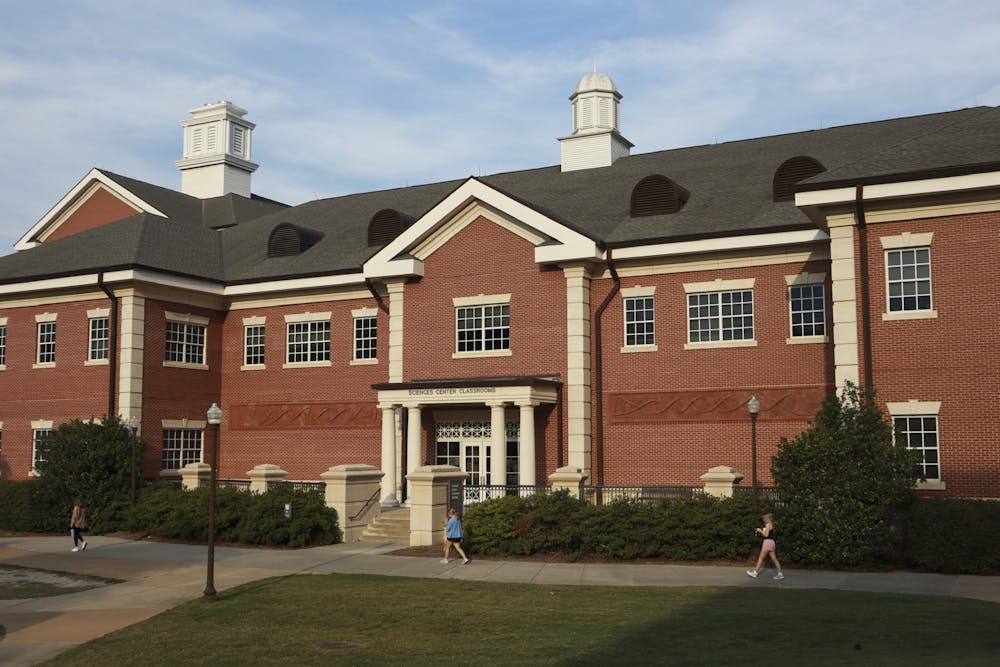The Auburn University Board of Trustees Academic Affairs Committee approved a doctoral degree program in statistics and data science, the first of its kind in the state of Alabama, at their Sept. 6 meeting. The program received strong support from the Dean of College of Science and Mathematics Edward Thomas, the graduate council, the provost and the president.
Vini Nathan, the university's provost and senior vice president for academic affairs, proposed in late July the doctoral degree program which entails an “in-depth understanding of both theoretical and practical aspects of statistics and data science, preparing them for careers in research, academia, or equivalent roles in industry or government.”
Current doctoral students at Auburn University interested in a statistics career must declare a major in mathematics with a concentration in statistics, completing distinct work from the mathematics program under the guidance of professors in statistics and data science.
PhD students with a statistics concentration did similar work as those with a declared major in statistics at other institutions, but because their degree had no statistics label, they could not market themselves as statisticians and data scientists.
Dr. Ash Abebe, chair of the Department of Mathematics and Statistics, explained these student's diplomas do not indicate that the student has any statistics instruction.
"To prove to employers that their degree's actually in statistics, we do several things. One is their transcript which shows the courses they took, and then, I often have to write letters saying that this actually is a degree in statistics," Abebe said.
Request for the major came from faculty first. Abebe names Dr. Nedret Billor, professor of statistics and a former director of the statistics program, as one of the leaders behind the program's creation.
“She was a force. I think that she did most of the actual leg work,” Abebe explained.
Abebe explained that it wasn't until students raised concerns about their degree's title that the movement to create the program began to accelerate.
While the Alabama Commission on Higher Education formally recognizes Auburn's PhD in mathematics, it does not formally recognize the statistics concentration as a program. Establishing a separate major was necessary to align with ACHE regulations.
“By making it now recognized by the university and the state, we’ll now be able to have that degree name included in their degree diploma, and that will make our students much more marketable," said Abebe.
Pending official approval from the ACHE, this program will promptly be implemented at Auburn University because the necessary resources have already been developed through the statistics concentration. According to Abebe, the mathematics and statistics department strategically prioritized the statistics program for several years.
Auburn University has offered a statistics concentration for decades, but the mathematics department lacked a strong faculty to lead the major. The biggest challenge the department initially had for the creation of the major was manpower.
“We had to go out and compete and recruit fantastic faculty who we have now. It’s not easy to get faculty in that area because we have to compete with industry, so the professors that we hire have to want to be professors because they’re not doing it for the money," Abebe said. "However, we have people that are really passionate about education and want to contribute to our research and growing the area and also educating the next generation, so that’s purely why they are there.”
As a pioneering program in the state, the doctoral degree program rivals similar schools like the University of Alabama’s PhD in applied statistics and the University of Alabama at Birmingham’s PhD in biostatistics. While UA focuses on practical use of statistics and UAB on applying statistics to issues specialized to public health, Auburn University is the only institution in Alabama to have a PhD program that includes both theoretical and applied statistics.
While researching, Abebe asks himself and his students questions on how to apply statistics to understand how technologies, such as artificial intelligence, work. "[I ask] can we provide theoretical understanding of how these systems are working? Can we provide theoretical guarantees for why things work?”" Abebe said.
Auburn University’s inclusion of theoretical statistics and specialized studies give them the upper hand in attracting a wider-range of statistics students, promoting growth in the department, according to Abebe.
“As a department, we truly believe that we have to occupy that space in data science that goes all the way from foundational data science like topological data analysis, which is very mathematical, all the way to applied data science on the other end,” Abebe explained.
Thomas, who is also a professor of physics, also framed the program both in terms of its educational value and economic benefit.
"I think what this means is that Auburn has a really unique opportunity to contribute to the rapidly growing field of data science," Thomas said. "This is something that both Auburn and the College of Sciences and Mathematics can really point to as a very forward looking opportunity, both in terms of research and student training, and ultimately, being able to contribute to this growing economy that's built around machine learning, and AI and data science.”
Machine learning algorithms utilize information in their datasets to conduct predictive analytics and data mining. The learning requires experts in statistical and data science research to create the pathways and data used. With artificial intelligence rapidly expanding in the last few years, experts in the field help "guide" the AI to the right sets of data and learn how AI performs its actions.
Since data science instruction can be helpful for all STEM students, the university officials wants to knit the subject through all five of the College of Science and Mathematics departments as well as the Biomedical Sciences program to graduate students proficient in data literacy, producing advanced prospects in the professional world.
“We live in a data rich society. Much of the information we receive right now about our surroundings is coming through some kind of data or data-informed processes, so I see us being a hub for that activity, for anything related to data science," Abebe said.
The goal is for all Auburn students to be data literate when they graduate.
Abebe wrote to the board, "The department’s statistics concentration already produces impressive alumni now working for top tier companies like Amazon. Since 2019, these students made up to 43% of all PhD graduates, and the department plans to expand upon this success by increasing enrollment by up to 14 additional students per year by Fall of 2028."
In materials submitted to the Board of Trustees, he also explained that the Bureau of Labor Statistics estimates a bright job outlook for this field. With a legitimate degree in statistics, students will meet employer expectations. Abebe believes that the new program will help with student and faculty recruitment, leading to cutting edge research, and create a seamless transition into the workforce for statistics graduates.
Waliu Lamidi, a first-year PhD statistics student, explained all organizations need statistics in some form. "So we can work in any industry, both medical, both hospital, both," said Lamidi.
There aren’t just benefits to advanced-level students.
"This growing program and statistics will be inspirational to the undergraduates in the program," Thomas said. "[It will] create more opportunities for our undergraduates to become involved in undergraduate research, and you know that hopefully will be a catalyst for those students to consider careers with advanced degrees in statistics or in mathematics.”
Lamidi cherishes his time at Auburn. Whether it's the people, education or environment, he proudly believes Auburn is brilliant. Lamidi, who works as a math tutor for the university, shares his experience with passionate, undergraduate students.
When discussing a student he was working with last night, he said, “we spent [an] extra 30 minutes, but she [was] just like asking questions about statistics and mathematics, and with the look of things that we look of her, I think she [has] interest in that course.”
The mathematics department has already expanded upon statistics upper-level degrees. In addition to the PhD, the department offers a master’s degree in data science and engineering, a partnership with the Department of Computer Science and Software Engineering.
To connect its upper-level and lower-level studies, Abebe explained that the mathematics department is working on an undergraduate degree for data science, creating a straight path of statistics and data science degree programs at Auburn.
Recruitment, both within and outside of Auburn University, is important for growing the statistics and data science program.
“We are hopeful we can start by Fall of 2025, but that depends on ACHE approval,” said Dr. Abebe. “We are very excited about this. We don’t get PhD programs approved everyday. I mean this is a rare occurrence at many universities, so this is really exciting for my department, really exciting for Auburn to be in this really fast, fast growing area and be able to compete as an institution."
Do you like this story? The Plainsman doesn't accept money from tuition or student fees, and we don't charge a subscription fee. But you can donate to support The Plainsman.
Jennifer Santiago, sophomore double majoring in political science and history, currently serves as the Newsletter Editor for The Auburn Plainsman. Since joining The Plainsman in the fall of 2024, she has previously served as a news writer and the Lifestyle Editor.





